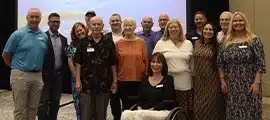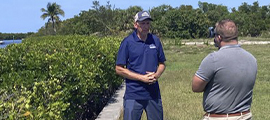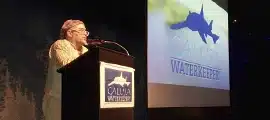Six Questions for Calusa Waterkeeper Executive Director, K.C. Schulberg
Q1: Calusa Waterkeeper recently produced the new film, “Troubled Waters.” Why did Calusa Waterkeeper make that film?
We made a proposal over a year ago to the Southwest Florida Community Foundation for the film, to communicate our water issues to the public, but we did not initially intend for it to be almost 40 minutes long. Since then, however, health ramifications became a bigger concern to people, not only from the risk of imperiled water but potentially from cyanotoxins traveling through the air, so the health aspect really lengthened the original project, as we incorporated interviews with many regional and national health experts, as well as from ordinary people and how this is affecting their lives.
One of the great things about “Troubled Waters” is we have such great cutting edge science in it, from neurologists to physician assistants, to what you would call citizen-scientists and everyone in-between, and all those perspectives allowed it to balloon from there and it really took off. Once we started filming, we only had five weeks to finish it, so we really scrambled over exactly what we should include in it, but that tight schedule allowed us to have the most up-to-date scientific information as we know it today. We finished shooting on July 13 and debuted it at the Broadway Palm Dinner Theater on August 5, and we really believe our finished product is not only relevant to Southwest Florida but to the rest of the country and beyond.
Q2: What do you hope the average person takes from “Troubled Waters?”
Most people in our region seem to have a pretty good handle on our water conditions, though we certainly address those in the film, along with the health risks from exposure to Blue-Green Algae and Red Tide, but what I think most will find enlightening is the possible transmission of how it can move through the air, as we really did not know about this a year ago when we were in the middle of our water crisis.
We continue to learn a lot about this possible airborne transmission, as it appears that the Blue-Green Algae-infested waters around Cape Coral canals are not really Ground Zero, but that you can be several miles away from that water and still be at an equal risk, so that is one of the general themes. In fact, the three main concepts behind making the movie are: to get the word out about the health concerns and the related risks; to let people hear from frontline doctors, researchers and the medical community about the most recent information; and how to get those discussions going with your own doctors and medical experts when you have issues with things like respiratory illnesses and other related concerns, so they take those conditions seriously. If we attain success with these three goals, even a little bit, then we have achieved our mission!
Q3: What did you yourself learn most from making “Troubled Waters” that perhaps you did not know or fully appreciate?
There is new information coming out all of the time, and that alone is a very important lesson! The biggie is what I touched on already, that you don’t have to be near or on the water to be at risk for exposure. While most people know to stay out of contaminated water, and to keep your pets away, as dogs can die within a few hours of drinking it, it was a revelation to me to learn the conclusions from Dr. Michael Parsons of Florida Gulf Coast University (FGCU) and his students. They set up equipment on the contaminated Cape Coral canals and found dangerous cyanobacteria and toxin readings that can go all the way down to the smallest parts of your lungs, but then they set up the same equipment well over 10 miles away at the Vester Research Field Station and came up with the exact same readings. That is a major new concern, as the risk to more and more people increases, and not just to those who live on or near the water. Unfortunately, there needs to be many more studies to prove these connections and determine if there are any negative health clusters in our region.
Another thing I learned is that, unfortunately, groups like Calusa Waterkeeper and FGCU are doing the job of what the Florida Department of Health should be doing, so it is up to us to get out the word and let people know the gravity of the situation with the best available information, so they can take proper precautions for their family and themselves. The more we get people talking about these risks and issues, especially the frontline people in the medical community, like general practitioners and nurses, with relevant training, then we are achieving one of the main motivations behind making “Troubled Waters.” This is what we are up against, because when it comes to the medical risks from Blue-Green Algae, Red Tide, cyanobacteria and toxins, we are playing catchup, as we are 10 years behind the 8-ball, scrambling to make gains.
What was clear last year, when Calusa Waterkeeper hosted its initial Water Summit, was that people were upset and that we needed to take advantage of that passion and continue to mobilize, and I think you see initial results from the immediate actions from new Florida Governor Ron DeSantis. Before it was just us crazy environmentalists, but after last year’s economic impacts, now it is people from the restaurant and hotel and fishing and ecotourism and real estate industries who joined the cause for the first time, and this led our political leaders in Tallahassee to pay more attention to us and less to the sugar and cattle industries and their lobbyists, so that is another new learn to me.
Q4: What reaction are you getting from people who saw “Troubled Waters?”
Well, we haven’t had a very broad sampling yet, as we hosted the debut on August 5 at the Broadway Palm, and that reaction was very good, with Calusa Waterkeeper receiving a lot of kudos. What was most gratifying that evening was that there were roughly 60 healthcare professionals in the audience, as those are the people who we really want to get this information, and their reaction was very positive! We are setting up screenings for Calusa Waterkeeper members, most likely in mid-September and are exploring the best avenue to put it out there for everyone.
Q5: You have an extraordinarily eclectic resume! How does someone with your varied background, especially from the entertainment industry, become Calusa Waterkeeper Executive Director?
That is an interesting story! In my entertainment career, I have been involved in roughly 200 movie and television productions. My father was in the movie-making business, as was my grandfather, all the way back to the 1920s, and my daughter is as well, so it is a four generation family affair! This family connection, in fact, led to my love of the environment, as when I was just a small boy in the late 1950s, my father and uncle came to Everglades City and made “Wind Across the Everglades” that many people consider the first major studio environmental movie!
While I try to avoid getting political, after the most recent presidential election, I put my movie career on hold and began providing more assistance to non-profit groups and social justice programs, especially with healthcare and the environment over water. John Cassani, the Calusa Waterkeeper, is a friend and he told me all about Calusa Waterkeeper, so I met with the Board and we hit it off, so they made the offer and I put my house on the market and signed up! It has been a real thrill so far and I feel we make accomplishments every day that benefit the community, even if many are small victories, so it is a privilege to carry this mission forward, to provide the public with clean and safe water.
Q6: What is the most rewarding aspect about being Calusa Waterkeeper Executive Director?
Seeing the growth of the organization, while getting out more and more information to more and more people! My most gratifying moments are when you are in a full house of people, like at the Broadway Palm for the opening of “Troubled Waters,” when folks realize how fundamental clean water is to our everyday lives, and they resolve that together we will get this done! Clean water is our health, livelihood, homes, kids and so much more. We are at a tipping point, so when people grasp that message, that is pretty thrilling!
View Original Article
























